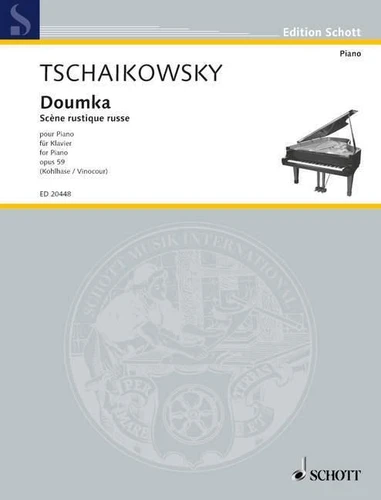Edition Schott
Doumka. Scène rustique russe. op. 59. piano.
Par : Formats :
- Paiement en ligne :
- Livraison à domicile ou en point Mondial Relay indisponible
- Retrait Click and Collect en magasin gratuit
- Réservation en ligne avec paiement en magasin :
- Indisponible pour réserver et payer en magasin
- Nombre de pages18
- Poids0.106 kg
- Dimensions23,1 cm × 30,3 cm × 0,0 cm
- ISBN979-0-001-15374-4
- EAN9790001153744
- Date de parution01/01/2009
- CollectionPIANO
- ÉditeurSchott
- EditeurThomas Kohlhase
Résumé
Tchaikovsky composed the Russian rural scene 'Dumka' in just a few days in late February 1886. 'Dumka' is originally the name of an epic and historical South West Slavic folk song of a melancholy nature. In Tchaikovsky's Op. 59, the elegiac andante cantabile forms the framework of the fast middle section in which brief formulaic thoughts, newly varied and increasing in virtuosic intensity, display fireworks of pianistic brilliance.
Being his only 'Morceau de Concert', this piece occupies a special place among the piano works of Tchaikovsky. As a pianist who rarely gave concerts and occasionally complained about the lack of interest from the keyboard titans of his time (Franz Liszt, Hans von Bülow and the brothers Anton and Nikolaj Rubinstein) in his music. Tchaikovsky certainly regarded the piece as a chance to make his music known outside of Russia.
So the French subtitle of the piece may rather be understood as a concession to the French audience. Instrumentation : piano op. 59
Being his only 'Morceau de Concert', this piece occupies a special place among the piano works of Tchaikovsky. As a pianist who rarely gave concerts and occasionally complained about the lack of interest from the keyboard titans of his time (Franz Liszt, Hans von Bülow and the brothers Anton and Nikolaj Rubinstein) in his music. Tchaikovsky certainly regarded the piece as a chance to make his music known outside of Russia.
So the French subtitle of the piece may rather be understood as a concession to the French audience. Instrumentation : piano op. 59
Tchaikovsky composed the Russian rural scene 'Dumka' in just a few days in late February 1886. 'Dumka' is originally the name of an epic and historical South West Slavic folk song of a melancholy nature. In Tchaikovsky's Op. 59, the elegiac andante cantabile forms the framework of the fast middle section in which brief formulaic thoughts, newly varied and increasing in virtuosic intensity, display fireworks of pianistic brilliance.
Being his only 'Morceau de Concert', this piece occupies a special place among the piano works of Tchaikovsky. As a pianist who rarely gave concerts and occasionally complained about the lack of interest from the keyboard titans of his time (Franz Liszt, Hans von Bülow and the brothers Anton and Nikolaj Rubinstein) in his music. Tchaikovsky certainly regarded the piece as a chance to make his music known outside of Russia.
So the French subtitle of the piece may rather be understood as a concession to the French audience. Instrumentation : piano op. 59
Being his only 'Morceau de Concert', this piece occupies a special place among the piano works of Tchaikovsky. As a pianist who rarely gave concerts and occasionally complained about the lack of interest from the keyboard titans of his time (Franz Liszt, Hans von Bülow and the brothers Anton and Nikolaj Rubinstein) in his music. Tchaikovsky certainly regarded the piece as a chance to make his music known outside of Russia.
So the French subtitle of the piece may rather be understood as a concession to the French audience. Instrumentation : piano op. 59


